 Janus Head Janus Head
11.1&2

Travels Inside the Archive
Robert Gibbons
Edge of Maine Editions

Beyond Time
New & Selected Work
1977 - 2007
Robert Gibbons
 The Age of Briggs & Stratton The Age of Briggs & Stratton
Peter Culley
|

Dorothea Lange
b. May 26, 1895
1 2 3
Heading East
Tomorrow morning I leave for the east coast for a couple of weeks.
Have not been back there since I made the jaunt in 1957 in a Chevy Nomad with my parents and these two guys (my brothers). That would be me on the right.

photo - my father
This time around the guy on the left (and his wife) are entertaining me in their trailer.
Return expected mid June.
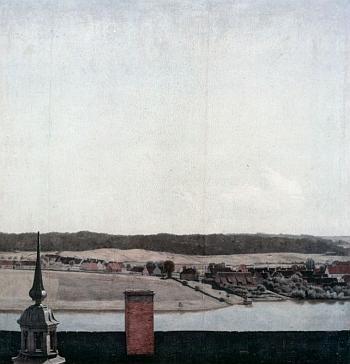
Christen Købke
b. May 26, 1810
_______________________
...a very good book to keep by your side during those encounters with the mundane that can vex the sensitive soul. For it is all about the mundane: the reactions of a sensibility who walks through early 20th-century Lisbon, looking at pedestrians, co-workers, grocers, the seasons, the times of day, unsure, in a kind of existential insomnia, whether he is dreaming or not, whether he exists or not.
Nicholas Lezard reviewing Margaret Jull Costa's translation of Pessoa's Book of Disquiet
Here, then, is a corner of the Modernist project, tucked away for posterity. If Pound and Eliot spent a lot of their early time wondering about the precarious nature of identity – one of Pound's collections was called "Personae", and Eliot said in "Prufrock" that "there will be time / To prepare a face to meet the faces that you meet" – Pessoa, whose name actually means "person" and, secondarily, "mask", was taking the concept of the ungraspable inner reality to something like its logical conclusion. I like Adam Phillips's take on this: "Because he did not find his voice, but his voices, Pessoa never fell into the trap of knowing what he was doing; he didn't need to imitate himself to keep writing."...(more)
via spurious_______________________
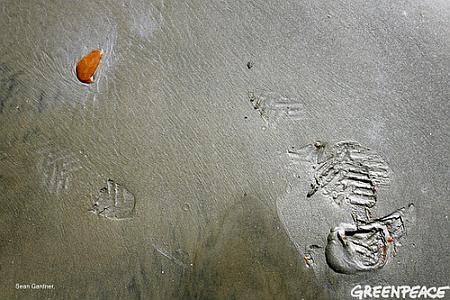 footprints in oil and sand
Gulf Oil Spill
Greenpeace flickr set
via Matt Christie
_______________________
from
The Reality Checklist
Angela Hibbs
ditch
(....)
If ten people in a row have a sister
they may be faking humanity.
Fields do not long to be beheld:
indifference is characteristic of reality.
Seeing all that is said as transcript:
false alarm.
Violins in torture chambers
may be a soundtrack. Disorientation
gathers in the real as much as the unreal.
If you wish you were somewhere else
reality may be upon you.
*This checklist is under construction.
*Unreal checkmarks should outnumber real.
*Refrain from using formulas for the real;
unknowns function differently in the unreal.
...(more)
four poemsAngela Hibbs diode
Wanton, by Angela Hibbs
Review by Brian Campbell
The Rover Wanton
Angela Hibbs
Insomniac Press
_______________________
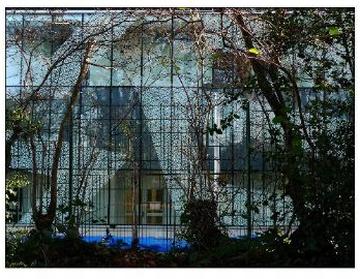
Mirrors, Windows, Walls
Mike Chisholm
blurb
One of several photography books by the voice of
Idiotic Hat
_______________________
Welcome to the Cultural Goodwill Revolution:
On Class Composition in the Age of Classless Struggle
Marc J Leger
The paradoxical class position of the petty bourgeoisie is that it is neither working class nor middle class but both; its ideological effect is, one the one hand, polarization, and on the other, a certain invisibility inasmuch as it privileges the thesis of classlessness. Technocratic powers have learned to exploit this contradiction to great effect and could do so because neoliberalism once seemed not only the engine of trade and deregulation, as the most advanced form of "turbo" capitalism, but also as a protective reaction to the vagaries of uncontrolled markets – noticed in particular in the creation of international trade blocks, in religious fundamentalisms and xenophobic nationalisms. In ways that Agamben could not have foreseen in the early 1990s, the militarization of the state in the capitalist democracies has been deepened through the biocapitalist manipulation of fear and delegitimation measures that have been normalized through the reactionary transformation of "civil society" institutions.
These contradictions are apparent in both the recuperation and disciplining of cultural criticism. One example of this is the recent arrest, interrogation and detainment of sociology professor Andrej Holm by the German federal police. Holm was detained because his publications contained words like "inequality," "precarization" and "gentrification," words that were construed by authorities as the kind of language used by militant terrorist organizations. Softer forms of censorship can take place through economic sanctions. For example, among the $45 million in cuts to arts funding announced by the Conservative Party of Canada in August 2008, Prime Minister Steven Harper singled out small grants that had gone to "radicals," "left-wing and anti-globalization think tanks," "ideological activists or fringe and alternative groups" and "highly ideological individuals exposing their agendas." If the civil liberties of artists and intellectuals producing politically-motivated work can be so easily revoked through repressive state action, it is partly because political power is distributed anonymously across all social institutions. One should be careful not to overstate the control exerted by disciplinary state apparatuses, however, since the purpose of neoliberal governmentality is largely to produce self-interested subjects who can act autonomously within market relations of inequality.(....)
From the outset, what the analysis of class composition suggests for cultural praxis is something along the lines of what Žižek refers to as revolution, the dialectical action of participating and not participating with those institutional arrangements that we cannot do without. This sinthomeopathic activity is set against three decades or more of complicit reconciliation with consumer capitalism that has by and large ignored the practical reality and consequences of capital accumulation and the restructuring of global capitalism. Lacan's concept of the sinthome is defined as a stage beyond the fundamental fantasy (ideological misrecognition), and which allows for a nonpathological (political) subjectivization (organization) of the symptom (cultural practice). In his Four Fundamental Concepts of Psychoanalysis, Lacan presented the dilemma of justified paranoia. In our case, this would mean that to oppose the symbolic order of institutionalized art practice is to risk exclusion; to negotiate with it is to allow one's actions to be determined by it. Since artistic freedom can no longer be thought of in terms of sacrificing oneself to the competitive struggle of aesthetic transgression, one must construct what after Lacan we could call sinthomeopathic solutions: lending oneself to institutional arrangements, the symptoms of contemporary cultural production, while still maintaining the fantasy of critical distance. This implies a "tarrying with the negative," which includes practical approaches to autonomy, institutions and the state. Without this a popular front will exist in name only and thousands more micro systems will contribute to the expansion of the system of systems....(more)
The Journal of Aesthetics and Protest issue 7
_______________________
Happiness is always a delusion
Adam Phillips
"Sanity involves learning to enjoy conflict, and giving up on all myths of harmony, consistency and redemption."
"There isn't going to be a radical personal change, which doesn't mean that people can't change usefully, but really that psychoanalysis is against magic. Ideally it enables you to realise why you're prone to believe in magic and why you shouldn't, because to believe in magic is to attack your own intelligence."
_______________________
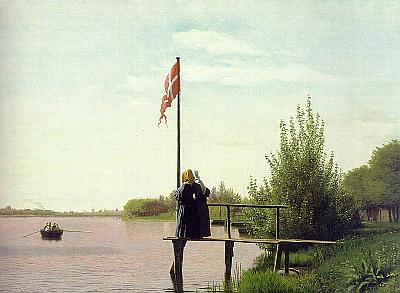
View of Lake Sortedam
Christen Købke
1838
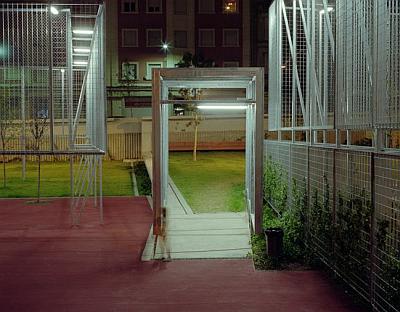
Marcos Goymil
via Jörg M. Colberg
_______________________
What is more natural: thinking space and poetry
Marcella Durand interviewed by Sina Queyras
Harriet - as it was
It’s debatable to me whether the term “eco-poetics” should be a defining term at all. It’s convenient and catchy, but poetry concerned with ecological issues needs to be flexible enough to accommodate the stream of information and rethinking and renaming that is ongoing around ecology, culture, science at the moment. Ecologically minded poetry may be more interesting, more investigative when there isn’t so much a predetermined manifesto, when it is not congealed into a sort of school with dictums to follow and practitioners. I realize this is rather hypocritical of me to say, since I did lay out a kind of schematics back in 2002 (“The Ecology of Poetry”), but I did from the start intend those to be possibilities only. I also meant that talk to be an alternative to the nature poetry I had been steeped in, but I didn’t want it to replace as the next de rigueur mode or whatever. Actually, the more I dig and think and research, the more all poetry seems like it could be read ecologically, as so much of writing deals with relations between self and other, re-engineering language subject, perception and exterior, where we fit into larger systems, landscape, history, culture—where and how we inhabit and how we negotiate with others inhabiting the same spaces....(more)
.....................................................
Three poems
Marcella Durand
jacket
Reading Postures 2
This character reclines into a sentence:
by the fire the safety whirling about
or weather balloon mounts the lighthouse,
a pleasant australian guides us to the
rubber rafts, marking, notation, a familiar
quotation, sinking into punctuation, a moat
surrounds us, while you lie sleeping, I describe
your face, in the drift of sheets & pillows,
a lighthouse with turbine lamps, in daytime
the sun lights the glass on fire, the fishing
fleet, by regarding the darkness, the pupil
becomes perceptive, a highlighter, a question
mark, some pleasant grecian slipped this
into our purse, declined to teach us about
worldliness, some peace corps volunteers
trashed the place, somebody's speaking
on the telephone, somewhere is that phone
booth, and making out inside, I can't make
out inside, the interior of this paragraph,
beside the telephone receiver, some pleasant
turn of phrase led us to this bed, and while
we lie here making out, the dog-earing
happens to this fine book, the silverfish
crawl along the margins, the pages cut
and uncut, dent, brittle, sticking to hands.
...(more)
Anselm Berrigan and Marcella Durand Interview Each Other
Five PoemsMarcella Durand
Marcella Durand at PennSound
Deep Eco Pre
Marcella Durand andTina Darragh _______________________
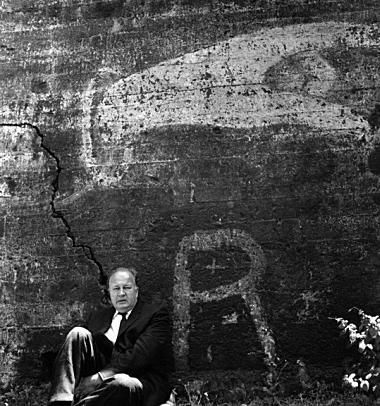
Theodore Roethke
b. May 25, 1908
photo by Imogen Cunningham, 1959
Dolor
Theodore Roethke
I have known the inexorable sadness of pencils,
Neat in their boxes, dolor of pad and paper weight,
All the misery of manilla folders and mucilage,
Desolation in immaculate public places,
Lonely reception room, lavatory, switchboard,
The unalterable pathos of basin and pitcher,
Ritual of multigraph, paper-clip, comma,
Endless duplicaton of lives and objects.
And I have seen dust from the walls of institutions,
Finer than flour, alive, more dangerous than silica,
Sift, almost invisible, through long afternoons of tedium,
Dropping a fine film on nails and delicate eyebrows,
Glazing the pale hair, the duplicate grey standard faces.
_______________________
The Voice of Things
Francis Ponge
translated by Beth Archer
pdf at aaaarg - free reg. req.
The Goat
(....)
These long-eyed beauties, hairy as beasts, beauteous and at the same time bumptious—or better said, Beelzebumptious— when they bleat, what are they bewailing? what torment? what distress?
Like old bachelors, they are fond of newspapers and
tobacco.
And in connection with goats, one should doubtless mention rope, and even (what pullings! what placid jerking obstinacy!) rope at the end of its rope, a rope whip.
That goatee, that grave accent. ..
They haunt rocky places.
(....)
Magnificent knucklehead, this dreamer, grandly flouting
his ideas, bears their weight but not without some
testiness useful for the brief acts assigned him.
These thoughts, formulated as weapons on his head,
for motives of high civility curve backward ornamentally;
Knowing full well, moreover—though of occult source
and readily convulsive in his deep sacks—
With what, with what love, he is burdened.
Here then, his phraseology on his head, is what he
ruminates between two sallies. _______________________
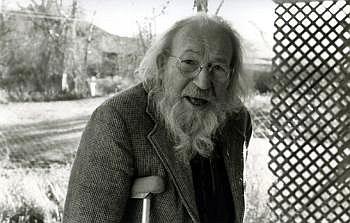
Judson Crews
1917–2010
photo by Mark Weber
the judson crews I know
Mark Weber
six poems
Judson Crews
Ron Silliman on Judson Crews' The Clock of Moss
_______________________
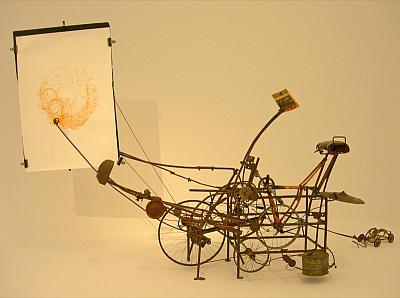
cyclograveur
Jean Tinguely
1925-1991
art machines machine art
_______________________
We Think in Public [PDF]
Paper presented at "Time Will Tell, But Epistemology Won't: In Memory of Richard Rorty"
Ian Bogost
Are we just kissing babies? The cynic might argue that, at best, writing leftist jive in The Atlantic amounts to a futures market hedge on intellectual commodities. Eventually one cashes in on a collection of pithy, outraged essays for University of Whatever Press, and a smooth, salty gravy to pour over a steamy promotion statement. Public intellectualism is only public when set in relief against the sordid, indulgent privatism of the liberal arts, which spends most of its collective time denigrating the general public for their false consciousness in the coffeeshop attached to the indie bookstore. Let's face it: thinking in public is orthogonal to scholarly life. The "public intellectual" is a contradiction in terms.
(....)
In one of his final essays, Rorty wrote in Poetry magazine: "I now wish that I had spent somewhat more of my life with verse." Poetry had long been a metaphor for Rorty, one format among many for producing language games. But for another clue to his purpose, we must return to Philosophy and the Mirror of Nature, and Rorty's discussion of edifying philosophy:
Edifying philosophers want to keep space open for the sense of wonder which poets can sometimes cause—wonder that there is something new under the sun, something which is not an accurate representation of what was already there, something which (at least for the moment) cannot be explained and can barely be described.
One way of thinking of "loving wisdom," Rorty continues, is to think of it as the practical effort necessary to participate in a conversation. This is a reminder worth heeding again, lest philosophy become to scholars what vats of comic books are to pop culture fans, simultaneous bearers of tiny secret truths and temptations to withdraw back into the basement of dorkship.
But "conversation" is just one tiny step in a broader return to the real world. I choose to understand poetry not merely as a use of language, but as a form that points to the many stones unturned—not the least of which are the stones themselves. It's not possible to get through the day without crossing hundreds, thousands, tens of thousands of ignored subjects of philosophy ready to be thought in earnest. The public of the public intellectual must cease to mean just the polity and also embrace the great outdoors. There perhaps we'll find a new ironist, a bird watcher as much as a philosopher out among the whippoorwills, the linen petticoats, the combine harvesters, the paper shredders, the salt water taffy, the magnolia blossoms, the waves that crash to shore, the bits that race from hard disks, the stippling on unseen bookplates—threading his toes through the rain that smears the ink of The Nation forever. via Dennis G. Jerz
_______________________
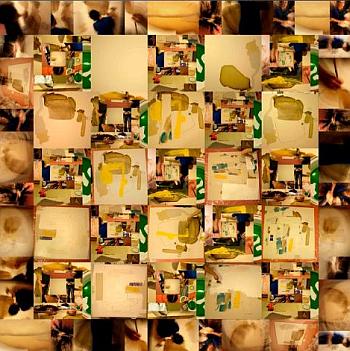
Stolen Moments
text and photographs by Erika Kapin
Camera Obscura
_______________________
The End of the Garden
Michal Ajvaz
Translated by James Naughton
(....)
Kant is of course partly excused by the fact that, as is generally known, he never left Konigsberg (though he speculated whether after our death we would inhabit other heavenly spheres), so that he quite certainly never encountered a Komodo lizard; on the other hand, however, he might surely have devoted at least a couple of lines to a creature as remarkable as the three-metre-long monitor lizard. Maybe this lizard is now pursuing him across the endless empty plains of some other star.
(Here, I think, lies the misfortune of philosophy: always we encounter on our travels some exceptional freak to which the philosophical rules are found to be non-applicable. Which are right - the freaks or the philosophical principles? I once had a lecture on this problem in a lift, inlaid with amber. On the one hand we are somewhat loathe to dispose of the whole thing merely by saying "so much worse for the freaks," on the other we are also reluctant to accept that the whole of our fine system of thought be dependent on some ugly old freak. At the same time we fail to grasp the relativity of the concept of "freakishness" - if there were no human beings with their evaluating criteria, there would be no "freakishness" either - also we ignore the vicious circle of reasoning to which we fall victim: freakish for us is that which falls outside our own sense of order, but simultaneously we proclaim that this breaching of our own sense of order proves nothing against its truth value, since after all we are simply dealing with a freak.)
So I followed this struggle, full of feelings of confusion and ambivalence, until finally I tapped the woman strangling the fretful lizard on the shoulder and said in an uncertain voice: ""Please leave the lizard alone"...(more)
_______________________
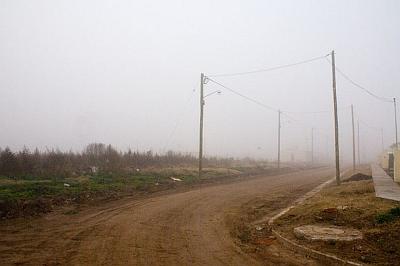
Marcos Goymil
_______________________
Brownie's back
Roger Gathman
news from the zona
At a certain point, the p.r. hallucinations will melt away. At a certain point, the giggly story about how BP is going to use dog hair and golf balls to plug the ‘leak’ will give way to stories about communities evacuating because their water source is contaminated. At a certain point, the dispersants poisoning the water will give way to vast rafts consisting of dead fish, dolphins, sea turtles and the like. At a certain point the humble, disposable Cajun fisherman ( an example of what the AEC would call “low use humans”, as they approved tests that shook fallout over poor southern Utah residents and other worthless scum) will give way to more suburban identifiable retired couples, looking in dismay as their beachfront property becomes a toxic dump. ...(more)
_______________________
The Canadian ‘good banks’ myth
Murray Dobbin
The sorry spectacle of Conservative cabinet ministers flying around the world defending banks from a tax to cover their next, inevitable, meltdown is bad enough. What is perhaps worse is that it is being largely justified by the perpetuation of the myth that Canada did not have to bail out its banks.
Wrong.
We are, according to the IMF, actually the third worst of the G7 countries, behind the US and Britain, in terms of financial stabilization costs.
First, we put up $70 billion to buy up iffy mortgages from the big five banks, through the Canadian Mortgage and Housing Corporation, taking them off the banks’ balance sheets. That is almost the exact equivalent the US bailout – it spent ten times as much, $700 billion, and its economy is about 10 times as large.
Secondly, the Harper government established a fund of $200 billion to backstop the banks – money they could borrow if they needed it. The government had to borrow billions – mostly from the banks! – to do it. It’s euphemistically called the Emergency Financing Framework – implying that our impeccable banks might actually face an emergency. It is effectively a line of low-interest credit and while it has not all been accessed, it’s there to be used. Could it help explain why credit has not dried up here as much as it has in the US?
Third, the government now insures 100% of virtually all mortgages through CMHC eliminating risk for the banks – and opening the door to the ridiculous flood of housing loans we have seen over the past few years. The result: housing has become unaffordable for tens of thousands of Canadians and new rental housing has dried up.
Why all this extraordinary effort?...(more)
_______________________

The Wire-Drawing Mill
1489
Albrecht Dürer
b. May 21, 1471
_______________________
Creative Destruction versus Restrictive Practices:
Deleuze, Schumpeter and Capitalism's uneasy relationship with technical innovation
Simon Glezos
ctheory
Understanding the relationship between capitalism and innovation in such a way creates a problem for those of us on the left who, on the one hand, wish to challenge the exploitation and violence of the capitalist axiomatic while, on the other, feel attracted to the power and promise that new technologies provide. We find ourselves wondering if capitalism is necessary to bring about this technological progress or, even worse, if the technological fruits of capitalism are fundamentally tainted by their lineage. By using the technology of advanced capitalism, are we necessarily forced to capitulate or deform ourselves to the requirements of the capitalist axiomatic?
This dilemma, however, changes radically if we challenge this essential, almost ontological, connection between capitalism and innovation -- not by arguing that capitalism doesn't possess an innovative drive, but by arguing that this drive is paralleled by an equally strong conservative drive. As much as capitalist enterprises are driven by market forces to introduce technological innovations, they are equally driven to limit, and frequently inhibit, technological innovation in ways which are necessary for them to maintain their control over the various processes of production, delivery, and consumption. This is why Deleuze and Guattari argue that, at the same time as the capitalist axiomatic is a deterritorializing machine, it is also an apparatus of capture which, though it deterritorializes various flows, always then "maintains the energy of the flows in a bound state on the body of capital."...(more)
_______________________
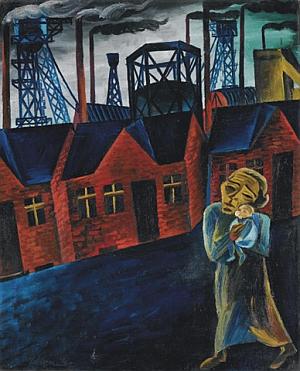 1920
Conrad Felixmüller
b. May 21,1897
1 2
_______________________
Aphorisms for Free (for RZ)
Lyn Hejinian
Aphorisms explain nothing
The aphorist applies a paddle to a sentence and then leans back to enjoy its drift
That’s my kind of aphorism
Aphorisms rhythmic, syncopated, and suggestive
Aphorisms anew
Let’s enjoy a plethora of aphorisms
Aphorisms point toward what remains to be thought about what is coming to be known
Let’s have a long aphorism
Aphorisms are like someone else’s lost earrings that, once found, need to be returned because they aren’t rightfully one’s own
A Mandarin aphorism, an aphorism in Urdu, an aphorism in French
An aphorism in a quandary
The aphorist will try again
Let’s construct an aphorism arena for aphoristic opera
Aphorisms challenge each other, bravo, and suggest that the re-decomposition of the cultural expertise they exemplify will clear the field for a bit of creative (though perhaps confused) tranquility
Like a blue geranium an aphorism casts a shadow of shaking milk
The best aphorism exerts more force than a small criminal act
An aphorism comes over a hill
...(more) The Tolerance Project Archive
The Tolerance Project
Lyn Hejinian at EPC
_______________________
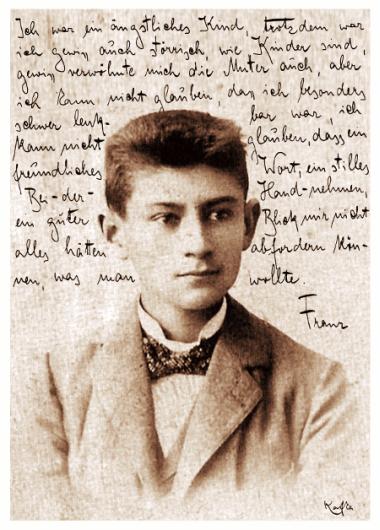
Letters to Milena
Franz Kafka
pdf at aaaarg - free reg. req.
_______________________
Kill Them All
Eight hundred years ago, crusaders slaughtered twenty thousand people in Languedoc, France. Today, fascination with the massacre has turned the region into a tourist trap.
Stephen O'Shea
Maisonneuve
Having caught the Cathar bug and written a book about the heresy ten years ago, I knew this celebration would be a devilishly difficult greeting card to send.(....)
...even the most academic fact-fetishist can scarcely deny that somebody somewhere must have said something similar on July 22, 1209—for every man, woman and child of the city, which sheltered as many as twenty thousand souls, was put to the sword. The day was a medieval Guernica, the rules of engagement and human mercy jettisoned in the service of spreading terror.
Now how the hell are you supposed to celebrate that? The questions, as the French say, pose themselves. Would the Irish convene a caeli for Oliver Cromwell, river-dancing in homage to the fanatic who led a vandalous army through seventeenth-century Ireland? Would the Cambodians hold a bash for Pol Pot; the Bosnians, a slivovitz-fuelled trip down memory lane to salute Milosevic? For the people of the south of France to celebrate the Albigensian Crusade seemed, at first glance, as unlikely as the folks of Dixie coming out in force to relive Sherman’s March. Both campaigns signalled the ferocious termination of a way of life. On second thought, strike that—Civil War re-enactors, after all, will seize on any excuse to spend a weekend sleeping rough in a ditch. As for the people of modern Languedoc, well, I knew from experience that they were an odd bunch, too....(more)
_______________________
Charter School Scandals
A record of the charter schools which have been publicly charged with, or are highly suspected of, tampering with admissions, grades, attendance and testing; misusing local, state, and federal funds; engaging in nepotism and conflicts of interest; engaging in complicated and shady real estate deals; and/or have been engaging in other unethical, borderline-legal, or illegal activities. And other unsavory tidbits.
via Stephen Downes
_______________________
The Speeds of Ambiguity: An Interview with Paul Virilio
pdf at aaaarg - free reg. req.
boundary (2010)
Today, perception could become stereo-reality. This is under the condition of maintaining the two realities separate, and not falling into glaucoma. Here, I believe there is a future for a perception, a perspective, of “real-time,” which would be just as important as the “real space” of the quarto cento. Reality today can become stereo-reality by way of screens and direct perception. There is an effect of the field of vision that comes from this doubling of stereo-real, stereoscopic perception as in stereophony. I think for the moment we are fascinated by the virtual and have a tendency to lose actual vision, direct vision. I think tomorrow we will have to restructure around a new type of perspective that I call the perspective of “real-time,” this effect of the visual field. We must take into account the new relief of both fields of vision, because we won’t lose the screens or direct perception. Here I think we have to go back to the perspectivists of the Middle Ages, to Paolo Uccello, to understand the importance of this real-time position of perception. The actual and the virtual. This is positive. We are not yet there.
_______________________
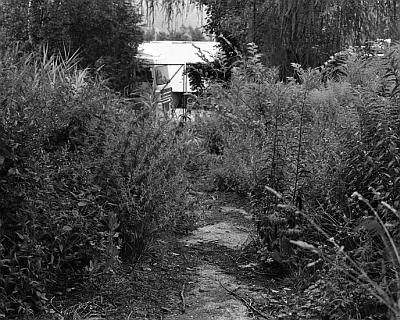
Road to the North
Daniel Augschoell
via Shane Lavalette
_______________________
“Hull the blockheads!”
John Latta
(....)So goeth the morning—ought to’ve stuck to Owhyhee. I admit it: I “got” to Zukofsky by wondering if Lorine Niedecker’d read Melville. No sign of it. Though she did say (in a letter to Edward Dahlberg, January 4, 1956): “Alfred North Whitehead thinks civilization is going to get a new start in grass-roots Midwest so I’ll see what I can do while you are in the woods of New York.” And (to Zukofsky himself, “dated by LZ: Apr. 29/45”):
Time is nuttn in the universe. The elephant may be on his way to becoming a worm, and vice versa, as a species, I mean. All of which I wanted to say in my poem but didn’t quite. “Fontenelle’s rose saying that within the memory of a rose no gardener had been known to die.” (This is the loveliest and most important thing I’ve read in a long time.)
See, too, Beckett’s version of Fontenelle’s “De mémoire de rose on n’a vu que lui [le m?me jardinier]”: “No gardener has died, comma, within rosaceous memory.” So goeth the morn.
...(more)
_______________________
Cyborg soldiers and militarised masculinities
Cristina Masters
eurozine
... techno-militarised masculinity has come to symbolise the model American soldier represented in the machine-man interface where technology constitutes soldiers and militarised masculinity constitutes technology. In so many ways, the machine-man interface is literal in the American military where everyday experience is characterised by constant interaction with advanced technology from weapons to computers, surveillance, reconnaissance, delivery systems, and from training simulations to real battle. However it is also significantly metaphorical, in that clearly it is not only male soldiers that interface with technology. Rather, the interface represents the discursive unhinging of male subjectivity from the physical male body and the reinscription of male subjectivity on/into military technologies. Put differently, masculinity does not necessarily coincide with the bio-male body. "It is not that the soldier is influenced by the weapons used; now he or she is (re)constructed and (re)programmed to fit integrally into the weapon systems." The significant effect is that advanced technologies are now the subjects of discursive constructions, and thus one of the key signifiers that perform and represent American identity. (....)
We can read cyborg desires as dominated by anxieties around threatened masculinity, indicating a deep crisis in American representations of self in its attempt to construct an invulnerable subject position by ridding itself of the fleshy body. This desperate, anxious, fearful, and violent attempt to make possible what can never be – the mastery of an American self. This has had profoundly violent effects on the fleshy bodies upon which American representations of self have been articulated and inscribed. In signalling a desire for, and a figure of, total control, the cyborg soldier is eviscerating and erasing the messiness and excess that makes embodied experience potentially subversive. This text is an attempt to bring forth experience and embodiment through a challenge to the very figure that is replacing the fleshy body as the subject of politics. As Vivienne Jabri argues, "When war is spectacle, experience and its materiality in the body are somehow occluded for discourses that merely see the aesthetic in its technological rendition. Any discourse that brings forth experience and its embodiment comes to constitute a moment of resistance." This text thus calls for a reengagement with the fleshy body – a call to take up the body as a critical site of "embodiment in all its complexity and irreducibility". ...(more)
_______________________

The Large Turf
1503
Albrecht Dürer

Cedar stump house
Edgecomb, Washington
Darius Kinsey
1901
via A Longhouse Birdhouse
_______________________
Mechanisms of Power in the Age of Terrorism
Carl Kandutsch
ctheory
One of the persistent themes in Tolstoy's War and Peace is its implication that history is made by war, and wars are fought not as a means of resolving international disputes or to achieve identifiable national objectives, but rather as a coming together of innumerable, mostly irrational localized forces operating in varying degrees of tension, harmony, coincidence and conflict with each other, far beyond the ability of any human mind to comprehend or control in the unfolding.
Tolstoy's conception, hatched at the end of the great century of crowds and collective ideologies, goes a long way toward explaining the persistence of wars in the 20th century and beyond (our own political leaders being no less subject to the quirks, temper tantrums and vanity than were Napoleon and Alexander), but war is still conceived of largely as a matter of borders -- the defense and the piercing of borders -- and of national sovereignty. At the dawn of the new century, the practice of globalization makes it difficult to think about war in terms of national borders; in fact, it may be more accurate to conceive of war as one medium by which the concept of borders -- and with it, the notion of national sovereignty -- are made increasingly irrelevant. Today, the function of war is not to defend the State against external enemies (freeing the State to, as it were, carry on its normal activities in peace), because the prosecution of war has become a normal function of State governance, like collecting taxes, enacting laws or compiling the census. The wars of today and tomorrow are conceived as globally-expanded policing activities intended to, among other things, regulate, discipline and pacify populations in far corners of the globe, and are sold to the public as ways of providing "security" -- an ephemeral and infinitely malleable concept. But if war-making is normalized, what then of war's opposite, namely, peace? ...(more)
_______________________

old growth forest
Washington
Darius Kinsey
1911
_______________________
Influency Salon Issue 2: Fruitful Disorder
Engaging Conversations with Contemporary Canadian Poetry
Michael Boughn, Margaret Christakos, Gary Michael Dault, Chris D'Irio, Sonja Greckol, Joan Guenther, Maureen Scott Harris, Claire Lacey, Margot Lettner, Norma Lundberg, Tanis MacDonald, Lynn McClory, Chantal Perrot, Meredith Quartermain, Jenny Sampirisi, Jordan Scott and Aaron Tucker.
Matter 22: Great guns disembogue [pdf]
Meredith Quartermain
bluster belch boister hiccup
take out of putting into our mouths
the play of geography – give us more play
in the rope to rake progress –
make wordmatters descend
in grandfathers and fathers, mothers and daughters.
The gurge of words regurgitates a blizzard
from its vortex of bearings,
the cosmic gullet disappears
in wars of scuds, it laughs typhoons.
Tycoons go on with earth for heaven
the tower and the story
for better and better. Mistaken.
...(more)
.....................................................
Little Vortices and the Life List: The Maelstrom of Matter
Tanis MacDonald on Meredith Quartermain's Matter I don’t know about you, but I do love a poetry book with an organizing principle. And I love to find poets with the courage to work with the organizing principle in both its incarnations: as the rule-making, law-giving, ordered march of ideas, and as the secret bringer of chaos, the whirlwind that we have reaped, the fecund wellspring of all things possible. I would like to talk tonight about Meredith Quartermain’s Matter in its many manifestations as a text that explores the interstices of science and literature; as a documentation of thought patterns; as an ecstatic observational text; as a love letter to language; as a celebration of bodies both with and without organs; as a book that reminds readers that words are entities that have matter, that are matter, that perform actions in the world, that are chosen because they are precise and wanted.
In Matter, the precision and profusion of these words, these building blocks of semantic edifices, or to use a more apposite scientific metaphor, these amino acids in the DNA of language do not offer themselves up like Al Capp’s Shmoos for intellectual consumption: that is, to be parsed, noted, and filed away. Instead, the words, so embodied here, consume the reader. To read Matter is to be swallowed and spit out, to squeeze through the punctilious nose of that large classifying, gathering bracket, and to be shot like a projectile into the tactile taxonomies of words as bodies, for no concept remains fundamentally abstract in Matter; each word becomes a “player on the stage of taxonomy” and every noun is a potential verb: “To ocean, to land”. The word is made flesh here, and the flesh is made word. To read Matter is to swim in an ocean that has acquired the organizing fervour of arborescence, a genealogical chart, an evolutionary system of classification....(more)
_______________________
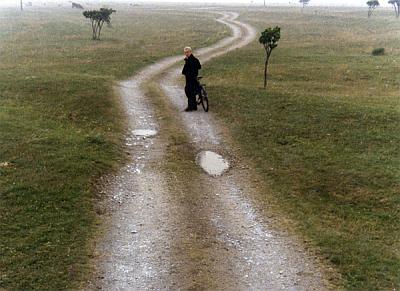
The Sacrifice
Andrei Tarkovsky
1986
.....................................................
Tarkovsky and Levinas: Cuts, Mirrors, Triangulations [PDF]
Dominic Michael Rainsford
The nature of film is such that it is difficult to feel that one takes it in completely; no sooner is one frame mentally captured than it is succeeded – in a process that could be called ‘jaillissement’ – by another. Film moves too fast for even the cinematographer to be in full control of the things that it throws up (over and above the way in which any kind of text may be uncontrollable by its author). Directors and editors can choose to minimise these characteristics of the medium, manipulating both images and audience so as to create a final sense of semiotic order and unambiguous declaration: such, according to a somewhat sweeping and antagonistic Tarkovsky, was the practice of Eisenstein, who ‘makes thought into a despot’. But Tarkovsky himself does his best to accentuate the life of its own that film, with its density and speed, possesses. And often, as in The Sacrifice, it is the very profusion and inexhaustibility of the sequence of images and the possible implications and offshoots of narrative that give hope to an otherwise generally bleak set of representations of human existence.
Here, then, there is an obvious starting point for the uneasy project of comparing Levinas with Tarkovsky (or indeed with anyone): both make the most of the resources of their respective media to speak distinctively but with a kind of self-undermining. The saying of the philosophical essay of the moment, and the unrolling of time, both in simulacrum and in the real time of the audience, in film, are both held up as somehow redemptive and transcendent in their resistance to reduction and control.
The Occluded Relation: Levinas and CinemaFilm-Philosophy
.....................................................
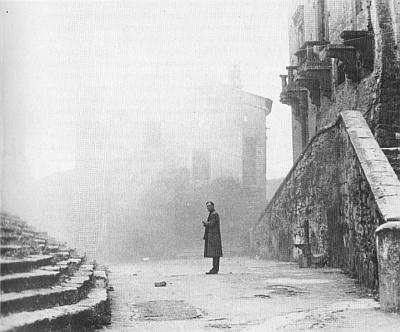
Nostalghia
Andrei Tarkovsky
1983
_______________________
eXchanges
University of Iowa's online literary magazine devoted to translation
Spring 2010 Issue: HACKWORK
Mémoires of Translation
Lawrence Venuti
I have learned foreign languages in drips and drabs, without the sustained attention that would eventually result in the achievement of native proficiency. In most cases, I have gained little more than reading knowledge, enough to conduct research or to translate, but far short of the ability to speak the language fluently. Perhaps this explains why I vividly remember pedagogical techniques, striking collocations, chance discoveries....(more)
_______________________
Stone Cottage: Pound, Yeats, and Modernism
James Longenbach
pdf at aaaarg - free reg. req.
Not just literary, but social and political attitudes were forged at Stone Cottage. In examining the poetry written by Pound and Yeats, it is important to remember that the two poets knew each other intimately. They lived in the same small rooms. They went for walks in the woods, drove motorcars, and watched soldiers hold maneuvers on the heath. Their poems do not exist only in a rarified world of textuality; the turns of influence and counter-influence occurred in concrete and identifiable ways. Consequently, my study of Pound and Yeats proceeds from my belief that it is impossible to separate their lives and work from the intellectual and cultural matrix in which they existed. Both the walls of Stone Cottage and the battles of the Great War play a part in the story of their friendship—just as current debates about the nature of literary criticism and the national debt have shaped the way I tell the story.
_______________________
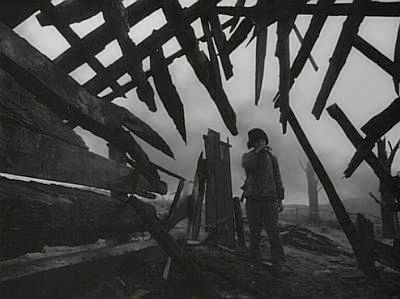
Ivan's Childhood
Andrei Tarkovsky
1962
_______________________
from The Errant Astrologers
A Legend in Verse in Three Acts
Felipe Ben?tez Reyes
translated by Emily Toder
eXchanges
AMER?N
The blind night,
and the moon that is the eye of the blind night,
the eye that looks at me
with the white look of the blind,
because the night is blind,
and the moon is the blind eye that looks at me
and sees me not.
I wander blinded by the blind night.
I float in the darkness
as the moon floats,
the blind eye,
and the blind night,
and the blind moon as well,
the useless eye,
and I wander blind,
invisible in this great dimness of blind theatre.
What am I doing here?
What are you doing there? you ask.
What are you doing there,
directionless in the blind night,
pilgrim of what,
spy of the dark without a cause,
prowling about?
The answer is simple: I have a path.
I am not the happy idiot
who speaks to the moon, that blind eye,
as the fawning subject speaks to his king
nor as the beggar whispers to his dog
when he hears the coming steps of cold death.
I am not the carefree idiot
who sings his idiot song
to stars who know not how to sleep.
No. I have a path.
I am not here
to ring the silver bells of the fool’s collar
before this sky of terrific immensity,
because the sky is not my master,
because the sky is not the haughty emperor of my destiny.
No.
I take no orders from the sky.
I am the one who watches over the sky.
The relentless spy
of this magical geometry of fearful stars,
of planets that turn
in accordance with exact laws.
I follow a path,
and that is my secret.
...(more)
_______________________

skid road
and vertical spool donkey engine
Washington, March 1894
Darius Kinsey
_______________________
Matter 9: To texture to verb
Meredith Quatermain
beached on the coast of specific gravity
at sea with fancy and sand for judgment
wonder steps on clams and mussels of metaphor
to skull and jaw, employing language to preposition.
To part in speech chalk and cheese, a dock
and a daisy – how very like a whale –
the moths, beetles, flies of Matter flutter
to harlequin Abstraction. Or vamp
the moods and tenses of Intellect. Then fidget Space
to veer, jibe, sidereal Volition
and shimmer Affection’s galaxy of spasms.
Suppose to patchwork world, hands wings fins
hook in peculiar loops the arteries of eggs in nests,
the spawn of the frog in water
the stripes on the cub of a lion,
the spotted chicks of blackbirds –
hook the framework’s splanchnology.
Suppose the tissue of matter is the change of matter,
its cleavage and strata – suppose we know what changes
changes sense.
It’s touch and go with the cat-tribes and plumage of stuff,
this disparate desperate otherwise.
Yes, we know means eyes and antennae
weave tooth
or grain a home-spun woolly cotton.
To text, to specify –
a whole without coherence
to sprinkle terrain, a world-thing mixed –
pregnant with alloy, laced with entanglement,
and haunted with purity.
Four from Matter
Meredith Quatermain
Green Integer Review
_______________________
The Poetry of Osip Mandelstam: A Radio Play by Paul Celan (Part Two)
Translated from Celan’s German by Pierre Joris
courtesy of Jerome Rothenberg
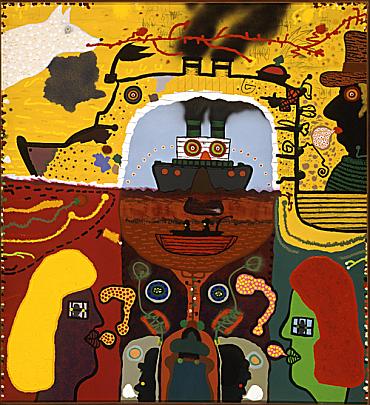
The Dipolar Girls Take a Voyage
on the St. Lawrence
1970
Roy De Forest
(11 February 1930–18 May 2007)
_______________________
Written in the stars?
Global finance, precarious destinies
Brian Holmes
eurozine
Where hard physics combines with traders' animal passions, the bestiary of financialized civilization becomes imbued with the relations between hunter and hunted. Systemic corruption has produced the fundamental disconnect between the informational sky above our heads and the existential ground beneath our feet.
_______________________
Words like songs
Helvi Juvonen (1919-1959)
Translated by Emily Jeremiah & Fleur Jeremiah
Books from Finland
The forest
I
Night swallowed day.
The forest was extinguished then.
Its green blackened,
and the empty paths
carried the day’s footprints
in their dreams
taking stopped time
into the morning.
But the wind got there first,
sounds rose.
The sleepy forest awoke,
not to sight,
not to light, to listen to itself
it ignited:
branches voiced their being,
treetops swished, leaves travelled,
not by means of tracks,
they moved only through sounds
from place to place
in the green of the shade,
hearing that which is truest
without the day.
II
In the morning, heaven’s weeping was visible:
its tear gleamed in the folds of leaves
like deepest pity,
which the day burns
when it begins a merciless heat,
a road through time.
The leaves twist and turn
and curl up with pain
when dust rains down
on the long road at whose end
evening’s sympathy is unchanging. ...(more)
Dreaming a dream: the poetry of Helvi JuvonenEmily Jeremiah Books from Finland_______________________
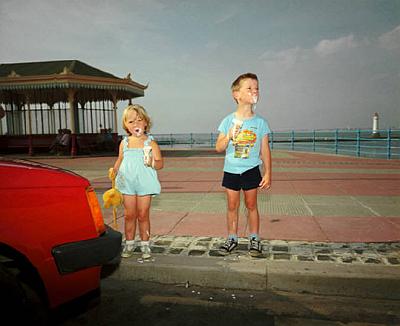
The Last Resort
1983-86
Martin Parr
_______________________
From the manuscript of Ghostmasters
Mani Rao
Void Plate
When the gates of spring squeaked in the mouths of birds I put out a hand
Sunflower seeds embedded in my flesh
A bare-breasted mother re-filled the feeder with liquid suet
Fat River Love
Fire Forest
O the knots on Osage for fire to suckle
Sootfaced I stood uncurling fruitdrops
I could not feed the fire considering it untouchable
My only way was through it
The only way to knowledge is through God I had to say
And what0000 is0 God000 she had to say
The void is the plate
Engraving zigzag
Fire the flare of sound through it
Voice ashen
Is this writing
Then where is my tongue
I’ve abandoned the pail and pitched my tent on seesaw water
What if I am my own witness
My ears believe each other
Almost Island
Mani Rao's website
100 Poems 1985-2005
Mani Rao
amazon
Innovation in Contemporary Indian Poetry
Edited by Mani Rao
HOW2
_______________________
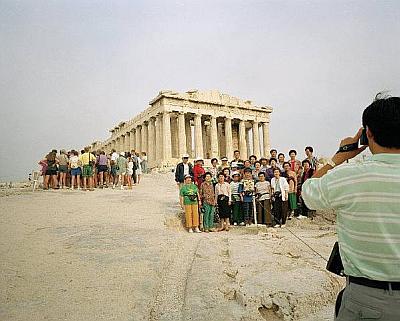
Small World
1991Martin Parr
1 2 Boundaries Merely Exist in People's Minds
Interview with Martin Parr
(2007)
_______________________

Diane di Prima
photo - Gary Carr
Diane di Prima: A Retrospective Collection of Essays
edited by David Hadbawnik
Big Bridge 14, 2010 .....................................................
Rant, from a Cool Place
Diane DiPrima
originally appeared in Evergreen #88, April 1971.
We are in the middle of a bloody, heartrending revolution
Called America, called the Protestant reformation, called Western man,
Called individual consciousness, meaning I need a refrigerator and a car
And milk and meat for the kids so, I can discover that I don't need a car
Or a refrigerator, or meat, or even milk, just rice and a place with
no wind to sleep next to someone
Two someones keeping warm in the winter learning to weave
To pot and to putter, learning to steal honey from bees,
wearing the bedclothes by day, sleeping under
(or in) them at night; hording bits of glass, colored stones, and
stringing beads
How long before we come to that blessed definable state
Known as buddhahood, primitive man, people in a landscape
together like trees, the second childhood of man
...(more)
.....................................................
Revolutionary Letters
Diane Di Prima
google books
_______________________
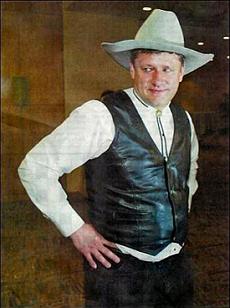
Harper's Christian Right Wing
The PM is fomenting a culture war, but his opponents barely seem to realize it.
Murray Dobbin
tyee
Who's influencing policy decisions in Stephen Harper's government?
Alheli Picazo
Culture wars: The commoners versus the end-timers
Murray Dobbin
rabble If you have ever heard the Christian end-timers (who welcome Armageddon and The Rapture that follows for them) defend Israel and hope for an all-out conflagration in the Middle East you could almost be forgiven if you dismissed them as marginal whack-jobs good only for a kind of black humour entertainment.
I said almost forgiven. Because as Marci McDonald points out in her new book, The Armageddon Factor: The Rise of Christian Nationalism in Canada, if you don't take these people seriously you may be quietly contributing to the demise of democracy and all the social democratic programs it has created in the past 50 years.
Stephen Harper takes them very seriously...(more)
The Divine Right
An interview with Marci McDonald, author of The Armageddon Factor: The Rise of Christian Nationalism in CanadaWalrus
_______________________
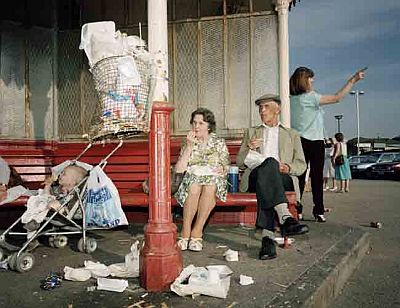
New Brighton
1985
Martin Parr
 1966-68
A.J. Casson
b. May 17, 1898
The Group of Seven
_______________________
Towards an Infinitesimal Novel: An Interview with Jean-Philippe Toussaint
Laurrent Demoulin
Context N°22
(....)LD: Camera is probably your most self-referential book . . . The first sentence, for instance, is almost a manifesto.
JPT: Yes, you’re right, it’s a manifesto, a program. I don’t know how aware of this I was. But still, it took me over a month to write the first paragraph. I still know it by heart. “It was at about the same time in my life, a calm life in which ordinarily nothing happened, that two events coincided, events that, taken separately, were of hardly any interest, and that, considered together, were unfortunately not connected in any way.” It’s a very radical opening, and it really is having fun with the readers. Here I am, a thirty-year-old writer saying: “What I’m about to tell you is absolutely irrelevant.” In other words: “I’m about to make you feel foolish.” It’s a very impertinent opening. I’m responding very offhandedly to Kafka’s famous aphorism: “In the fight between you and the world, back the world,” with “In the fight between you and reality, be discouraging.” So yes, it’s a manifesto, but it isn’t a theoretical essay or piece; it’s there, in the book itself, in the opening paragraph of the book, as a theory in action. Underlying my novel is, although it isn’t expressed theoretically, an idea of literature focused on the insignificant, on the banal, on the mundane, the “not interesting,” the “not edifying,” on lulls in time, on marginal events, which are usually excluded from literature and are not dealt with in books....(more)
Context N°22.....................................................
translation at Context
Translation Editing: An Unedited Conversation
John O’Brien and Jeremy M. Davies
Premises of a new Translation Pedagogy:
Changing the Paradigm of Cultural Studies
Elizabeth Lowe
How Was It for You? On Cooperative Translation
Ros Schwartz and Lulu Norman
_______________________

Patent Composition Cabinet
Jones-Underhill
Of Goose Quills, Gloves, and Writing Booths
A Succinct Survey of Authors' Accessories and Accoutrements
Gilbert Alter-Gilbert
a journey round my skull
_______________________
Of Satire and Laughter:
A Grim Post on a Funny Subject (Curing Wealthy Families of Vice and Folly)
PBC
gift hub
As an Adept, well-initiated into the sublime mysteries of our Noble Trade, I vouchsafe these truths, formerly guarded under a thousand seals of silence, since Wealth Counseling demands the greatest tact and secretiveness, given the many high crimes and misdemeanors routinely committed by our Ideal Clients, our country's leading families:...(more)
_______________________
Someone is Writing a Poem
Adrienne Rich
(1993)
In a political culture of managed spectacles and passive spectators, poetry appears as a rift, a peculiar lapse, in the prevailing mode. The reading of a poem, a poetry reading, is not a spectacle, nor can it be passively received. It’s an exchange of electrical currents through language—that daily, mundane, abused, and ill-prized medium, that instrument of deception and revelation, that material thing, that knife, rag, boat, spoon/reed become pipe/tree trunk become drum/mud become clay flute/conch shell become summons to freedom/old trousers and petticoats become iconography in appliqué/rubber bands stretched around a box become lyre. Diane Glancy: Poetry uses the hub of a torque converter for a jello mold. I once saw, in a Chautauqua vaudeville, a man who made recognizably tonal music by manipulating a variety of sizes of wooden spoons with his astonishing fingers. Take that old, material utensil, language, found all about you, blank with familiarity, smeared with daily use, and make it into something that means more than it says. What poetry is made of is so old, so familiar, that it’s easy to forget that it’s not just the words, but polyrhythmic sounds, speech in its first endeavors (every poem breaks a silence that had to be overcome), prismatic meanings lit by each others’ light, stained by each others’ shadows. In the wash of poetry the old, beaten, worn stones of language take on colors that disappear when you sieve them up out of the streambed and try to sort them out....(more)

Adrienne Rich
b. May 16, 1929
Adrienne Rich at PennSound and The Poetry Foundation
_______________________

telegraph room
the original Mundaneum
Brussels
The Web Time Forgot
Alex Wright
nyt
Inside the Mundaneum
Molly Springfield
Snail-mail Google and a card-catalog Web: a fin-de-si?cle Belgian information scientist’s proto-Internet
Triple Canopy
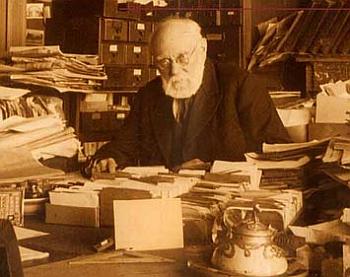
Paul Otlet
1868-1944
founder of the Mundaneum
_______________________
Basic Banalities
Raoul Vaneigem
April 1962
translation by Ken Knabb
“Any act,” writes Mircea Eliade, “can become a religious act. Human existence is realized simultaneously on two parallel planes, that of temporality, becoming, illusion, and that of eternity, substance, reality.” In the nineteenth century the brutal divorce of these two planes demonstrated that power would have done better to have maintained reality in a mist of divine transcendence. But we must give reformism credit for succeeding where Bonaparte had failed, in dissolving becoming in eternity and reality in illusion. This union may not be as solid as the sacraments of religious marriage, but it lasts, which is all that the managers of coexistence and social peace can ask of it. This is also what leads us to define ourselves — in the illusory but inescapable perspective of duration — as the end of abstract temporality, as the end of the reified time of our acts; to define ourselves — does it have to be spelled out? — at the positive pole of alienation as the end of social alienation, as the end of humanity’s term of social alienation. ...(more)
_______________________
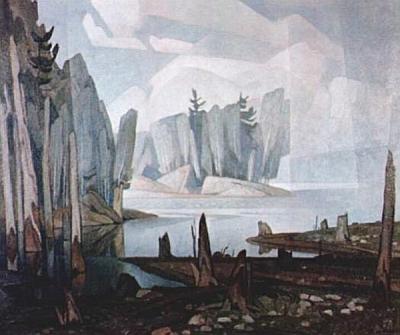
Silver Morning
A.J. Casson
_______________________
Girls, Guergis, Guns & Armageddon
hysperia
mirabile dictu
Stephen Harper and the Theo-cons
The rising clout of Canada’s religious right
Marci McDonald
The Walrus October 2006
The Armageddon Factor: The Rise of Christian Nationalism in Canada
Marci McDonald
amazon
How Canada’s Christian right was built
Marci McDonald
The Christian Right and its influence in the public square
Eric Mang
_______________________
If Nixon and Dubya had a baby ...
Dan Gardner
ottawa citizen
Stephen Harper has never been accused of being affable and charming, but his handling of the pardon issue --and many others like it -- is pure Dubya.
Hence, my conclusion about his parentage. Combine Richard Nixon's personality with George W. Bush's decision-making style and you have Canada's prime minister. And the makings of a really bad executive.
Of course one might think this can't be so. Stephen Harper is prime minister, after all. Surely, such a successful man cannot be such a bad executive.
Au contraire, my naive rhetorical device. Remember that prior to taking control of the Conservative party --which would not have happened if a decade of civil war hadn't shrunk the list of serious leadership candidates to zero -- the largest organization Stephen Harper ever ran was the National Citizens Coalition. It had a staff that could be counted on one hand and the tip of the boss's nose.
And is it really so hard to believe that people can, with lots of luck and bravado, soar far above their level of competence? (See Palin, Sarah.) After eight years of George W. Bush's Dilbert administration, I would think that argument is settled.
Along with Stephen Harper's paternity....(more)
_______________________
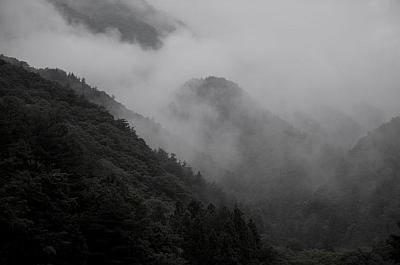
Sea of Trees
Joshua Zucker - Pluda
.....................................................
The Sea of Trees
Mapping the Japanese forest where the spirits of suicides linger, silence reigns, and compasses fail.
Nine Eglantine Yamamoto-Masson and Joshua Zucker-Pluda, with Jacob Kirkegaard
WHEN MOUNT FUJI ERUPTED for the second time, in 864 A.D., lava streamed down its northeastern face and into the lake at its base. The area was transformed into a volcanic plateau; a network of caves ran deep below the surface and into the lake bed. In the centuries that followed, evergreen and beech trees grew; their roots clawed the moss-covered rocks, siphoning nutrients and water. A fifteen-square-mile forest was formed: Aokigahara Jukai, the Sea of Trees. Today its trees are so numerous and densely packed that they block out the sunlight and wind. Their roots intertwine, forming gnarled nests of strands shooting in every direction. The foliage absorbs all sound. Walking through the forest, it is impossible to see the sky beyond the canopy or to determine one direction from another. The magnetic materials in the igneous rocks are said to render compasses useless. ...(more)
Triple Canopy 8
_______________________
Cartographies of Silence
Adrienne Rich
(....)
3.
The technology of silence
The rituals, etiquette
the blurring of terms
silence not absence
of words or music or even
raw sounds
Silence can be a plan
rigorously executed
the blueprint of a life
It is a presence
it has a history a form
Do not confuse it
with any kind of absence
(....)
7.
It was an old theme even for me:
Language cannot do everything-
chalk it on the walls where the dead poets
lie in their mausoleums
If at the will of the poet the poem
could turn into a thing
a granite flank laid bare, a lifted head
alight with dew
If it could simply look you in the face
with naked eyeballs, not letting you turn
till you, and I who long to make this thing,
were finally clarified together in its stare
...(more)
|
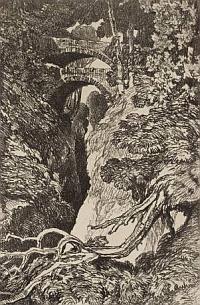
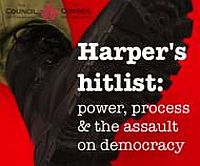
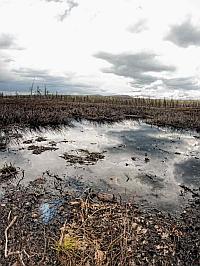
 Janus Head
Janus Head

 The Age of Briggs & Stratton
The Age of Briggs & Stratton


































